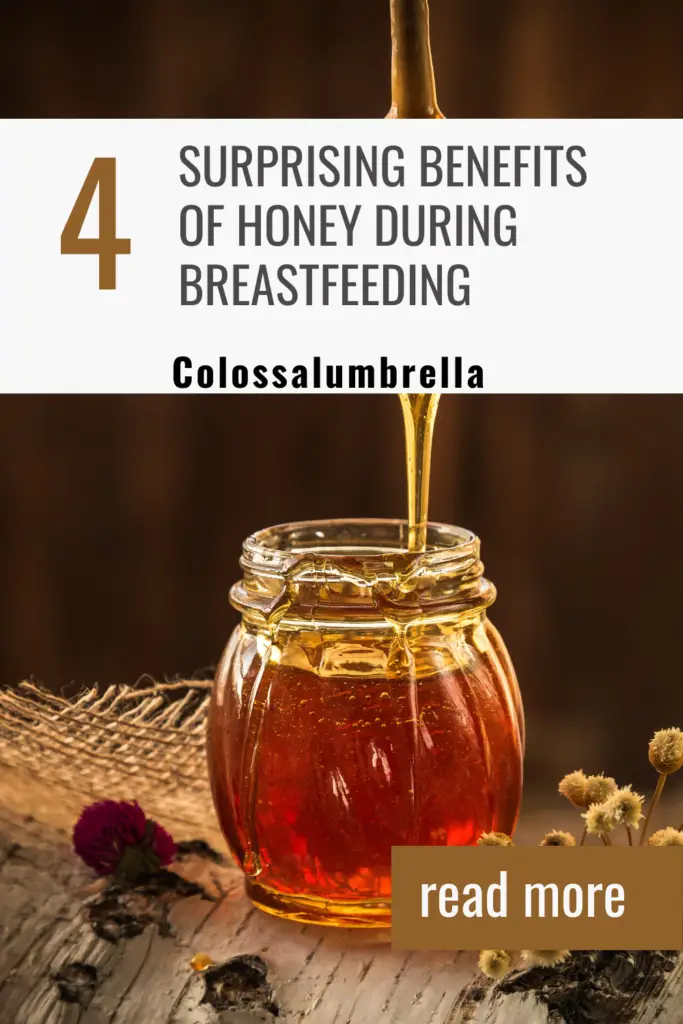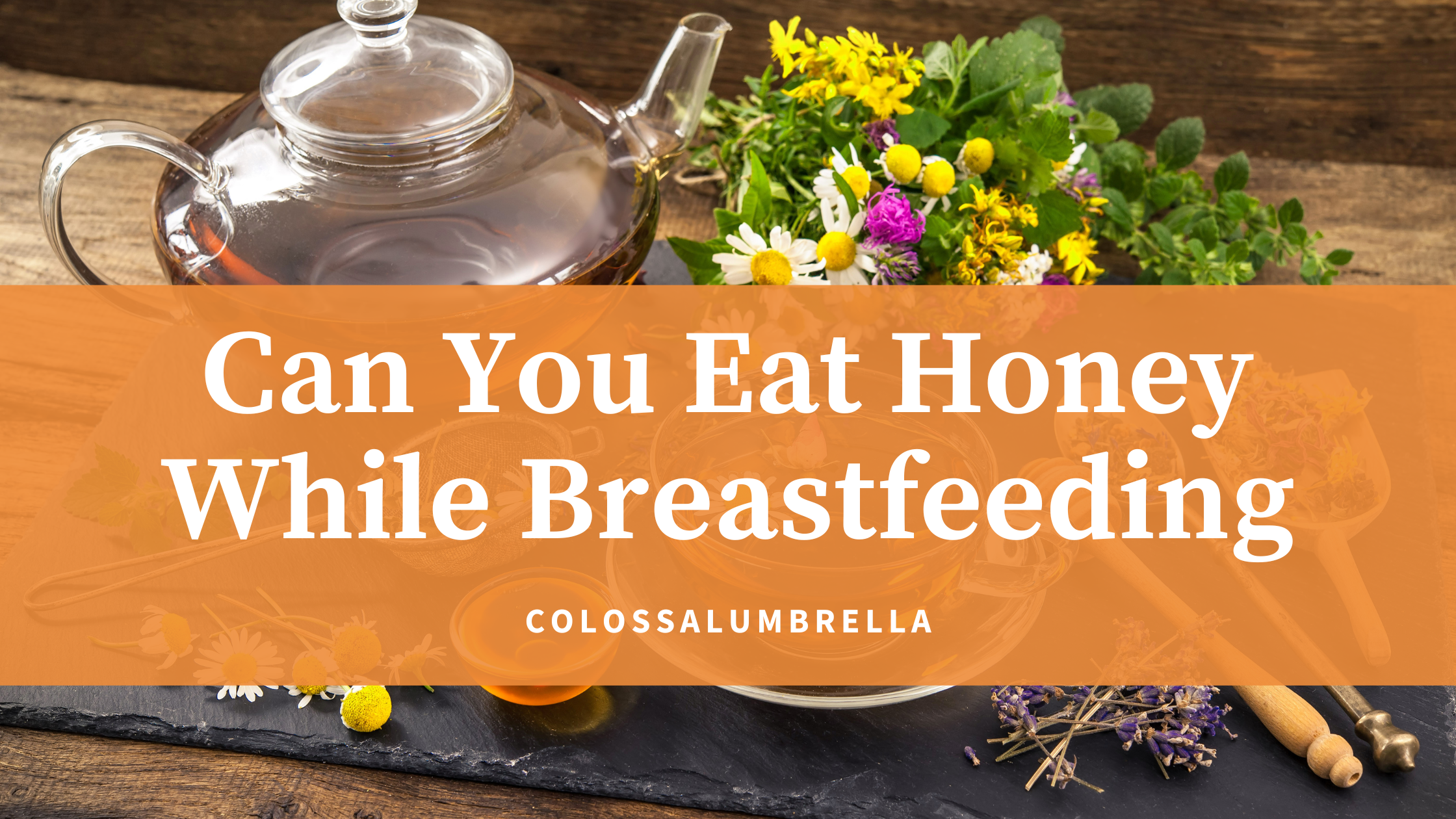Contents
Breastfeeding, is the art of nourishing your little munchkin with love, nutrients, and secret superhero antibodies! But hold on, superhero mom, have you stumbled upon the question, can you eat honey while breastfeeding? It’s like the enchanted potion of the bees, right?
Now, picture this, you, the superhero mom, wielding the power of breastfeeding, while your baby gazes into your eyes like they’ve just discovered a hidden treasure! It’s a beautiful bonding experience, like two adventurers exploring uncharted lands of love and nourishment.
But wait! On this heroic journey, you must beware the treacherous tales of honey, whispered through the grapevine of motherhood lore. Some say it’s linked to the elusive infant botulism, a mythical curse that could cast a shadow upon your precious baby’s health.
Don’t worry In this blog post, we shall venture through the mysterious realms of honey’s safety while breastfeeding. We’ll unravel valuable insights, like finding the map to the fountain of yummy nutrients and immune-boosting properties.
Subscribe to my blog for Parenting tips that will make you feel like a pro, and get access to exclusive free Printables that will keep your little ones busy and happy!
Is Honey Safe for Infants?
Before we delve into the safety of consuming honey while breastfeeding, it’s essential to understand why honey is not recommended for infants under the age of 12 months. Infants have an underdeveloped immune system, making them susceptible to a rare but dangerous condition called infant botulism. Botulism is caused by the Clostridium botulinum bacterium, which can be present in honey.
Honey may contain spores of the Clostridium botulinum bacterium, which can release toxins when ingested. These toxins can affect the infant’s nervous system, leading to weakness and breathing difficulties. The immature digestive system of an infant is unable to handle these toxins, making them particularly vulnerable to botulism.
Can You Eat Honey While Breastfeeding?
While honey poses a risk to infants, the same does not apply to breastfeeding mothers. Your immune system is fully developed and can handle the spores present in honey before they pose any risk to your health or your baby’s. Yes, you can eat honey while breastfeeding. The botulism toxins are not passed from you to your baby through breast milk, ensuring their safety.
During pregnancy, your immune system is naturally weakened to prevent it from attacking the developing fetus. This weakened immune system makes it challenging for your body to fight off harmful bacteria and parasites found in certain foods. However, when you are breastfeeding, your immune system regains its strength, allowing it to fend off potentially dangerous foodborne pathogens and prevent them from reaching your baby through breast milk.
The Benefits of Honey While Breastfeeding
Honey is not only safe for breastfeeding mothers but also offers several potential health benefits. It is important to note that honey should be consumed in moderation due to its high sugar content. However, when consumed responsibly, honey can provide various vitamins, minerals, amino acids, zinc, iron, and antioxidants.

Some potential benefits of honey while breastfeeding include:
Suppressing Coughs
Honey has been traditionally used as a natural cough suppressant. The thick consistency of honey can soothe the throat and provide relief from persistent coughing. However, it is important to note that honey should not be given directly to infants under 12 months of age, as mentioned earlier.
Relieving Gastrointestinal Symptoms
Certain gastrointestinal conditions, such as diarrhea caused by gastroenteritis, can be alleviated with the consumption of honey. Its antibacterial and anti-inflammatory properties may help reduce inflammation and promote healing in the gastrointestinal tract.
Promoting Wound Healing
Medical-grade honey, rather than the honey available at grocery stores, has been shown to have wound-healing properties. It can be particularly effective in treating burns and other skin injuries. However, it is crucial to consult with a healthcare professional before using honey as a topical treatment for wounds.
Offering Neurological Benefits
Some studies suggest that honey may have neurological benefits, acting as an antidepressant, anticonvulsant, and memory booster. These potential benefits are attributed to the presence of antioxidants and other bioactive compounds in honey. However, further research is needed to fully understand the extent of these effects.
Guidelines for Consuming Honey While Breastfeeding
While it is generally safe to consume honey while breastfeeding, there are a few guidelines and precautions to keep in mind to ensure your safety and that of your baby.
Choosing the Right Type of Honey
When selecting honey to consume while breastfeeding, it is crucial to choose high-quality honey that has been properly processed and pasteurized. Pasteurization helps eliminate any potential bacteria or contaminants, making the honey safer to consume. Raw honey should be avoided, as it may contain spores that can pose a risk to your health.
Moderation is Key
As with any sweetener, moderation is essential when consuming honey while breastfeeding. Honey is primarily composed of sugar and should be consumed in small quantities to prevent excessive sugar intake. The American Heart Association recommends limiting daily sugar intake to no more than 25 grams for women, which is roughly equivalent to six teaspoons.
Precautions and Considerations
While honey is generally safe for breastfeeding mothers, it is important to be mindful of certain considerations. Wash your hands thoroughly before handling your baby to eliminate any potential contamination from honey. Additionally, always check the manufacturing and expiry dates before purchasing honey to ensure its freshness and quality. If you have any concerns or questions about consuming honey while breastfeeding, consult with your healthcare provider for personalized advice.
Other Foods to Avoid While Breastfeeding
While honey is safe for breastfeeding mothers, there are other foods and substances that should be avoided or consumed in moderation during this period. It is important to maintain a balanced and nutritious diet while breastfeeding to ensure the optimal health of both you and your baby. Here are some foods and substances to be cautious about:
Alcohol and Caffeine – Consuming alcohol and excessive amounts of caffeine while breastfeeding can have negative effects on your baby. Alcohol can pass through breast milk and may interfere with your baby’s sleep patterns and development. Similarly, high caffeine intake can lead to irritability, poor sleep, and other potential side effects in your baby. It is advisable to limit alcohol consumption and monitor your caffeine intake to avoid any adverse effects.
High-Mercury Fish and Marijuana – Certain types of fish, such as swordfish, tilefish, and king mackerel, are known to contain high levels of mercury. Mercury can be harmful to your baby’s developing nervous system. It is recommended to avoid these high-mercury fish varieties while breastfeeding. Additionally, the use of marijuana while breastfeeding should be avoided, as it can pass through breast milk and potentially affect your baby’s development and well-being.
Potential Allergens – While rare, some babies may have sensitivities or allergies to certain foods that their mothers consume while breastfeeding. It is important to monitor your baby for any signs of discomfort or adverse reactions after consuming certain foods. Common allergenic foods that may cause a reaction in some babies include dairy products, eggs, nuts, soy, and wheat. If you suspect that your baby may have an allergy or sensitivity, consult with a healthcare professional for guidance.
Honey as a Natural Remedy
Honey has been used for centuries as a natural remedy for various ailments and conditions. While more research is needed to fully understand its therapeutic properties, honey has shown potential in several areas.
- Cough Suppressant – Honey has long been used as a natural remedy to soothe coughs and relieve throat irritation. Its thick consistency provides a coating effect that can alleviate coughing and promote comfort. However, it is crucial to note that honey should not be given directly to infants under 12 months of age due to the risk of botulism.
- Gastrointestinal Relief – Some studies suggest that honey may help alleviate gastrointestinal symptoms, such as diarrhea caused by gastroenteritis. Its antibacterial and anti-inflammatory properties may contribute to reducing inflammation in the gastrointestinal tract and promoting healing. However, it is important to consult with a healthcare professional before using honey as a remedy for gastrointestinal issues.
- Wound Healing and Neurological Benefits – Medical-grade honey, which is different from the honey available at grocery stores, has been found to have wound-healing properties. It can be particularly effective in treating burns and other skin injuries. Additionally, honey has shown potential neurological benefits, including its use as an antidepressant, anticonvulsant, and memory booster. However, further research is needed to fully understand the extent of these effects.
People Also Ask
Does honey affect breast milk supply?
No, honey doesn’t directly impact breast milk supply. A balanced diet is crucial for adequate milk production.
What foods to avoid while breastfeeding?
Avoid spicy foods, excessive caffeine, allergenic foods, and gas-producing foods. Monitor your baby’s reactions and seek guidance if needed.
What honey is safe for breastfeeding?
Choose commercially processed honey to ensure safety, avoiding raw honey with potential botulism spores.
Can a breastfeeding mother take lemon and honey?
Yes, lemon and honey can be enjoyed in moderation, providing potential health benefits in warm water. Monitor any possible reactions in your baby.
Conclusion
In conclusion, it is safe for breastfeeding mothers to consume honey. While infants under 12 months should not be given honey directly, breastfeeding mothers can enjoy the potential benefits of honey in moderation. Honey offers various vitamins, minerals, antioxidants, and potential health benefits.
However, it is important to choose high-quality honey, consume it in moderation, and be mindful of potential allergens and other foods to avoid while breastfeeding. As always, consult with your healthcare provider for personalized advice and guidance on your specific dietary needs while breastfeeding.
Disclaimer: The content of this blog is for informational purposes only and is not intended to be a substitute for professional medical advice, diagnosis, or treatment. Always seek the advice of your physician or other qualified healthcare providers with any questions you may have regarding a medical condition.
I would stay connected and keep you updated with parenting tips, pregnancy guides, creative ideas, easy crafts, and Free Printables. Subscribe to Colossalumbrella to get new ideas delivered to your inbox. Follow me on Facebook, Pinterest, Twitter, and Instagram.
